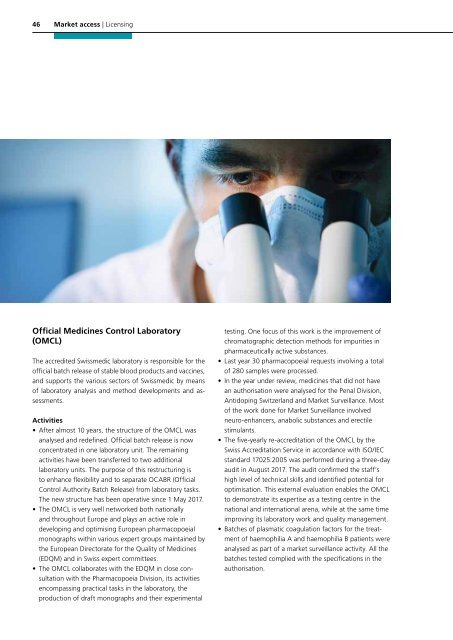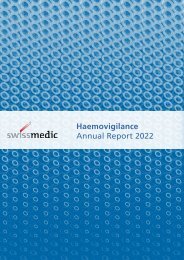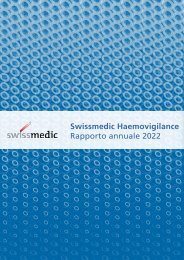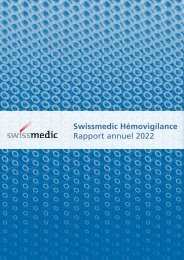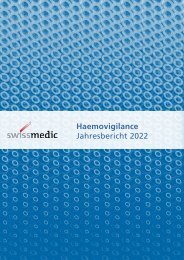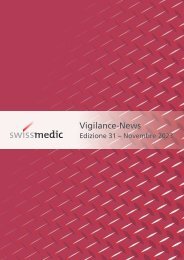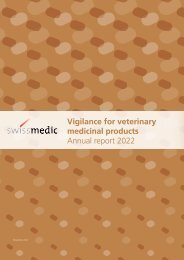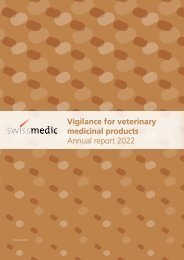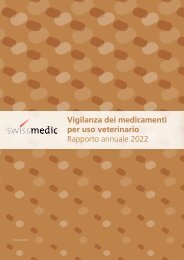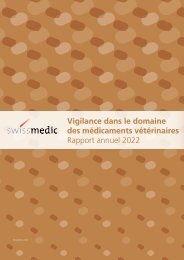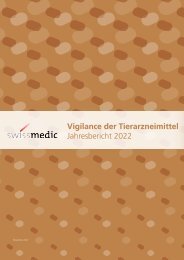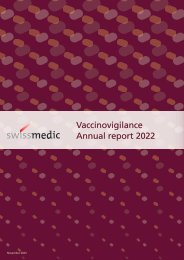Swissmedic Annual Report 2017: achieving success through collaboration
According to Stéphane Rossini, incoming Chairman of the Agency Council, the culture of collaboration will remain a factor in ensuring that Switzerland is successful in retaining a high-quality medicines control system: “A globalised economy and the international consumption of therapeutic products entail synergies and collaboration.”
According to Stéphane Rossini, incoming Chairman of the Agency Council, the culture of collaboration will remain a factor in ensuring that Switzerland is successful in retaining a high-quality medicines control system: “A globalised economy and the international consumption of therapeutic products entail synergies and collaboration.”
Create successful ePaper yourself
Turn your PDF publications into a flip-book with our unique Google optimized e-Paper software.
46 Market access | Licensing<br />
Official Medicines Control Laboratory<br />
(OMCL)<br />
The accredited <strong>Swissmedic</strong> laboratory is responsible for the<br />
official batch release of stable blood products and vaccines,<br />
and supports the various sectors of <strong>Swissmedic</strong> by means<br />
of laboratory analysis and method developments and assessments.<br />
Activities<br />
• After almost 10 years, the structure of the OMCL was<br />
analysed and redefined. Official batch release is now<br />
concentrated in one laboratory unit. The remaining<br />
activities have been transferred to two additional<br />
laboratory units. The purpose of this restructuring is<br />
to enhance flexibility and to separate OCABR (Official<br />
Control Authority Batch Release) from laboratory tasks.<br />
The new structure has been operative since 1 May <strong>2017</strong>.<br />
• The OMCL is very well networked both nationally<br />
and <strong>through</strong>out Europe and plays an active role in<br />
developing and optimising European pharmacopoeial<br />
monographs within various expert groups maintained by<br />
the European Directorate for the Quality of Medicines<br />
(EDQM) and in Swiss expert committees.<br />
• The OMCL collaborates with the EDQM in close consultation<br />
with the Pharmacopoeia Division, its activities<br />
encompassing practical tasks in the laboratory, the<br />
production of draft monographs and their experimental<br />
testing. One focus of this work is the improvement of<br />
chromatographic detection methods for impurities in<br />
pharmaceutically active substances.<br />
• Last year 30 pharmacopoeial requests involving a total<br />
of 280 samples were processed.<br />
• In the year under review, medicines that did not have<br />
an authorisation were analysed for the Penal Division,<br />
Antidoping Switzerland and Market Surveillance. Most<br />
of the work done for Market Surveillance involved<br />
neuro-enhancers, anabolic substances and erectile<br />
stimulants.<br />
• The five-yearly re-accreditation of the OMCL by the<br />
Swiss Accreditation Service in accordance with ISO/IEC<br />
standard 17025:2005 was performed during a three-day<br />
audit in August <strong>2017</strong>. The audit confirmed the staff’s<br />
high level of technical skills and identified potential for<br />
optimisation. This external evaluation enables the OMCL<br />
to demonstrate its expertise as a testing centre in the<br />
national and international arena, while at the same time<br />
improving its laboratory work and quality management.<br />
• Batches of plasmatic coagulation factors for the treatment<br />
of haemophilia A and haemophilia B patients were<br />
analysed as part of a market surveillance activity. All the<br />
batches tested complied with the specifications in the<br />
authorisation.


